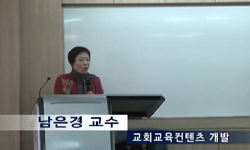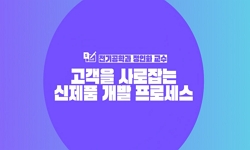A smart environment is a living condition where the next generation of the faith community resides in. Thus, it is necessary to endeavor to understand the smart learners who have different ways of thinking and cultures. Also, it is necessary to enhanc...
http://chineseinput.net/에서 pinyin(병음)방식으로 중국어를 변환할 수 있습니다.
변환된 중국어를 복사하여 사용하시면 됩니다.
- 中文 을 입력하시려면 zhongwen을 입력하시고 space를누르시면됩니다.
- 北京 을 입력하시려면 beijing을 입력하시고 space를 누르시면 됩니다.

스마트 환경에서 관계적 역량 증진을 위한 교회 교사교육 프로그램 개발 = Development of a Teacher Education Program in Church to Enhance Relational Competencies in a Smart Environment
한글로보기https://www.riss.kr/link?id=A103793895
- 저자
- 발행기관
- 학술지명
- 권호사항
-
발행연도
2013
-
작성언어
Korean
-
주제어
smart environment ; relational competency ; church ; teacher education program ; development ; 스마트 환경 ; 관계적 역량 ; 교회 ; 교사교육 프로그램 ; 개발
-
등재정보
KCI등재
-
자료형태
학술저널
-
수록면
67-90(24쪽)
-
KCI 피인용횟수
2
- DOI식별코드
- 제공처
-
0
상세조회 -
0
다운로드
부가정보
다국어 초록 (Multilingual Abstract)
Education in smart environments not only means beyond education using smart media and infrastructure, but also implies innovation in educational methods and strategies. This study critically reviewed preceding research on teacher education from the aspects of contexuality, feasibility, adaptability, reciprocality, and sustainability. Based on the literature review, this study suggested design principles to develop a teacher education program: principles of story linking, modularized curriculum, adaptive implementation, reciprocal reflection, and team-based activity, which are abbreviated to s.m.a.r.t.. Based on these principles, the teacher education program is developed as twelve modules of distinct and interconnected subjects, each of which is composed of stories of daily life, the Bible, smart education, and smart teachers in sequential activities. Implementation of the developed program is adaptable as the teachers can minimize intra-and-inter personal differences by using the competence diagnostic scale. Finally,this program allows teachers to engage in reciprocal reflection and team-based activities within the teacher community.
This study has an implication of integrating Christian education and educational technology in the process of drawing design principles and developing a teacher education program, and can be further developed to verify the effects of the program.
A smart environment is a living condition where the next generation of the faith community resides in. Thus, it is necessary to endeavor to understand the smart learners who have different ways of thinking and cultures. Also, it is necessary to enhance relational competencies to communicate in various means in order to equip for the educational ministry with the next generation in a smart environment.
Education in smart environments not only means beyond education using smart media and infrastructure, but also implies innovation in educational methods and strategies. This study critically reviewed preceding research on teacher education from the aspects of contexuality, feasibility, adaptability, reciprocality, and sustainability. Based on the literature review, this study suggested design principles to develop a teacher education program: principles of story linking, modularized curriculum, adaptive implementation, reciprocal reflection, and team-based activity, which are abbreviated to s.m.a.r.t.. Based on these principles, the teacher education program is developed as twelve modules of distinct and interconnected subjects, each of which is composed of stories of daily life, the Bible, smart education, and smart teachers in sequential activities. Implementation of the developed program is adaptable as the teachers can minimize intra-and-inter personal differences by using the competence diagnostic scale. Finally,this program allows teachers to engage in reciprocal reflection and team-based activities within the teacher community.
This study has an implication of integrating Christian education and educational technology in the process of drawing design principles and developing a teacher education program, and can be further developed to verify the effects of the program.
국문 초록 (Abstract)
스마트 환경에서의 교육은 스마트 미디어나 인프라를 활용하는 차원을 넘어, 교육방법및 전략의 혁신을 의미한다. 따라서 이 연구는 교육의 맥락성, 실행가능성, 적응성, 호혜성, 그리고 지속가능성의 측면에서 교사교육에 관한 선행연구를 비판적으로 성찰하였다.
이를 토대로 도출한 교사교육 프로그램의 설계 원리는 이야기 연결의 원리, 모듈화된 교육과정의 원리, 적응적 실행의 원리, 호혜적 성찰의 원리, 팀 기반 활동의 원리로서, 스마트(s.m.a.r.t.)로 요약할 수 있다. 최종적으로 개발한 교사교육 프로그램은 일상의 이야기와성경이야기, 스마트 교육이야기와 스마트 교사되기 등이 순차적으로 연결되도록 하였으며, 12개 주제는 상호연관성을 지니되 독립적인 내용으로 모듈화 하였다. 또한 교사들의 개인내 차이와 개인 간 차이를 최소화하기 위해 역량 진단을 통해 적응적으로 교육을 실행할수 있도록 하였으며, 교사공동체에서의 호혜적 성찰 및 팀 기반 활동으로 진행할 수 있도록 하였다.
이 연구는 선행연구에 대한 분석을 통해 교사교육 프로그램의 설계 원리를 도출하고개발하는 과정에서 기독교교육과 교육공학의 학문 간 대화를 시도했다는 점에서 의의가있으며, 프로그램의 효과성을 검증하기 위한 후속 연구를 준비하고 있다.
스마트 환경은 신앙공동체의 다음세대가 살아가는 삶의 배경이다. 스마트 환경에서 다음세대와 함께 하는 교육사역을 준비하기 위해서는 기성세대와는 다른 사고방식과 문화를가지고 있는...
스마트 환경은 신앙공동체의 다음세대가 살아가는 삶의 배경이다. 스마트 환경에서 다음세대와 함께 하는 교육사역을 준비하기 위해서는 기성세대와는 다른 사고방식과 문화를가지고 있는 학습자를 이해하려는 노력과 다양한 방식으로 소통할 수 있는 관계적 역량을증진시킬 필요가 있다.
스마트 환경에서의 교육은 스마트 미디어나 인프라를 활용하는 차원을 넘어, 교육방법및 전략의 혁신을 의미한다. 따라서 이 연구는 교육의 맥락성, 실행가능성, 적응성, 호혜성, 그리고 지속가능성의 측면에서 교사교육에 관한 선행연구를 비판적으로 성찰하였다.
이를 토대로 도출한 교사교육 프로그램의 설계 원리는 이야기 연결의 원리, 모듈화된 교육과정의 원리, 적응적 실행의 원리, 호혜적 성찰의 원리, 팀 기반 활동의 원리로서, 스마트(s.m.a.r.t.)로 요약할 수 있다. 최종적으로 개발한 교사교육 프로그램은 일상의 이야기와성경이야기, 스마트 교육이야기와 스마트 교사되기 등이 순차적으로 연결되도록 하였으며, 12개 주제는 상호연관성을 지니되 독립적인 내용으로 모듈화 하였다. 또한 교사들의 개인내 차이와 개인 간 차이를 최소화하기 위해 역량 진단을 통해 적응적으로 교육을 실행할수 있도록 하였으며, 교사공동체에서의 호혜적 성찰 및 팀 기반 활동으로 진행할 수 있도록 하였다.
이 연구는 선행연구에 대한 분석을 통해 교사교육 프로그램의 설계 원리를 도출하고개발하는 과정에서 기독교교육과 교육공학의 학문 간 대화를 시도했다는 점에서 의의가있으며, 프로그램의 효과성을 검증하기 위한 후속 연구를 준비하고 있다.
참고문헌 (Reference)
1 김효숙, "형식적 교사교육에서 비형식적 학습공동체로의 확장에 관한 연구" 한국기독교교육학회 27 (27): 443-472, 2011
2 옥장흠, "한국기독교장로회 교단의 교사교육 효율성 증진 방안" 한국기독교교육학회 27 (27): 411-442, 2011
3 한미라, "한국 기독교교육학의 비판적 성찰" 한국기독교교육학회 29 (29): 57-86, 2012
4 양금희, "이야기⋅예술⋅기독교교육" 장로회신학대학교 출판부 2010
5 김현철, "스마트교육 콘텐츠 품질관리 및 교수학습 모형 개발 이슈" 한국교육학술정보원 2011
6 권성호, "스마트 환경에서의 교육사역 역량에 관한 연구" 한국기독교교육정보학회 35 (35): 291-324, 2012
7 오성주, "새로운 교사교육 방향 모색" 한국기독교교육학회 17 (17): 131-157, 2008
8 염지숙, "내러티브 탐구(Narrative Inquiry)를 통한 유아 세계 이해: 유치원에서 초등학교 1학년으로의 전이 경험 연구를 중심으로" 2 (2): 57-82, 1999
9 송수지, "기독교 대안학교 교사들의 좋은 수업에 대한 인식" 한국기독교교육정보학회 33 (33): 1-35, 2012
10 박상진, "교회학교 부흥을 위한 교사교육의 새로운 패러다임" 예영커뮤니케이션 2007
1 김효숙, "형식적 교사교육에서 비형식적 학습공동체로의 확장에 관한 연구" 한국기독교교육학회 27 (27): 443-472, 2011
2 옥장흠, "한국기독교장로회 교단의 교사교육 효율성 증진 방안" 한국기독교교육학회 27 (27): 411-442, 2011
3 한미라, "한국 기독교교육학의 비판적 성찰" 한국기독교교육학회 29 (29): 57-86, 2012
4 양금희, "이야기⋅예술⋅기독교교육" 장로회신학대학교 출판부 2010
5 김현철, "스마트교육 콘텐츠 품질관리 및 교수학습 모형 개발 이슈" 한국교육학술정보원 2011
6 권성호, "스마트 환경에서의 교육사역 역량에 관한 연구" 한국기독교교육정보학회 35 (35): 291-324, 2012
7 오성주, "새로운 교사교육 방향 모색" 한국기독교교육학회 17 (17): 131-157, 2008
8 염지숙, "내러티브 탐구(Narrative Inquiry)를 통한 유아 세계 이해: 유치원에서 초등학교 1학년으로의 전이 경험 연구를 중심으로" 2 (2): 57-82, 1999
9 송수지, "기독교 대안학교 교사들의 좋은 수업에 대한 인식" 한국기독교교육정보학회 33 (33): 1-35, 2012
10 박상진, "교회학교 부흥을 위한 교사교육의 새로운 패러다임" 예영커뮤니케이션 2007
11 신언혁, "교회학교 교사를 위한 교사교육 프로그램 개발" 한국기독교교육정보학회 9 (9): 425-452, 2004
12 한미라, "교회의 교사교육 실태와 성서적 대안" 한국기독교교육정보학회 21 (21): 275-314, 2008
13 오인탁, "교회 교사교육의 현실과 방향" 대한기독교출판사 1987
14 김화선, "교사교육의 반성과 모색" 11 : 263-297, 2005
15 Palmer, P. J., "가르침과 배움의 영성" 한국기독학생회출판부 2000
16 Wimberly, A. S., "Soul stories: African American Christian Education" Abingdon Press 2005
17 김효숙, "Design of a Learning Environment Based on Media Ecology" 기독교사상과문화연구원 42 (42): 277-294, 2011
동일학술지(권/호) 다른 논문
-
과정신학의 관점에서 성인의 성숙한 관계성을 위한 기독교교육
- 한국기독교교육학회
- 백은미
- 2013
- KCI등재
-
한국교회 북한선교의 현황과 한계, 그리고 기독교교육적 접근의 새로운 모색
- 한국기독교교육학회
- 임창호
- 2013
- KCI등재
-
기독교교육에서의 교육평가에 관한 한 연구 -Nicholas Wolterstorff의 기독교교육 사상을 중심으로-
- 한국기독교교육학회
- 소진희
- 2013
- KCI등재
-
기독교교육과 커리큘럼의 진단과 제안-A 대학교 기독교교육과 사례를 중심으로-
- 한국기독교교육학회
- 장화선
- 2013
- KCI등재
분석정보
인용정보 인용지수 설명보기
학술지 이력
| 연월일 | 이력구분 | 이력상세 | 등재구분 |
|---|---|---|---|
| 2022 | 평가예정 | 재인증평가 신청대상 (재인증) | |
| 2019-01-01 | 평가 | 등재학술지 유지 (계속평가) |  |
| 2016-01-01 | 평가 | 등재학술지 유지 (계속평가) |  |
| 2015-03-31 | 학회명변경 | 영문명 : The Korean Society Of Christian Education -> The Korean Society of Christian Religious Education |  |
| 2014-12-31 | 학술지명변경 | 외국어명 : A Journal of Christian Education in Korea -> Journal of Christian Education in Korea |  |
| 2012-01-01 | 평가 | 등재 1차 FAIL (등재유지) |  |
| 2009-01-01 | 평가 | 등재학술지 선정 (등재후보2차) |  |
| 2008-01-01 | 평가 | 등재후보 1차 PASS (등재후보1차) |  |
| 2006-06-30 | 학회명변경 | 영문명 : The Korean Society Of Christian Education -> The Korea Society for the Study of Christian Religious Education |  |
| 2006-06-21 | 학회명변경 | 영문명 : The Korean Society Of Christian Education -> The Korean Society for the Study of Christian Religious Education |  |
| 2006-01-01 | 평가 | 등재후보학술지 선정 (신규평가) |  |
학술지 인용정보
| 기준연도 | WOS-KCI 통합IF(2년) | KCIF(2년) | KCIF(3년) |
|---|---|---|---|
| 2016 | 1.22 | 1.22 | 1.12 |
| KCIF(4년) | KCIF(5년) | 중심성지수(3년) | 즉시성지수 |
| 0.96 | 0.87 | 1.101 | 0.15 |





 스콜라
스콜라






